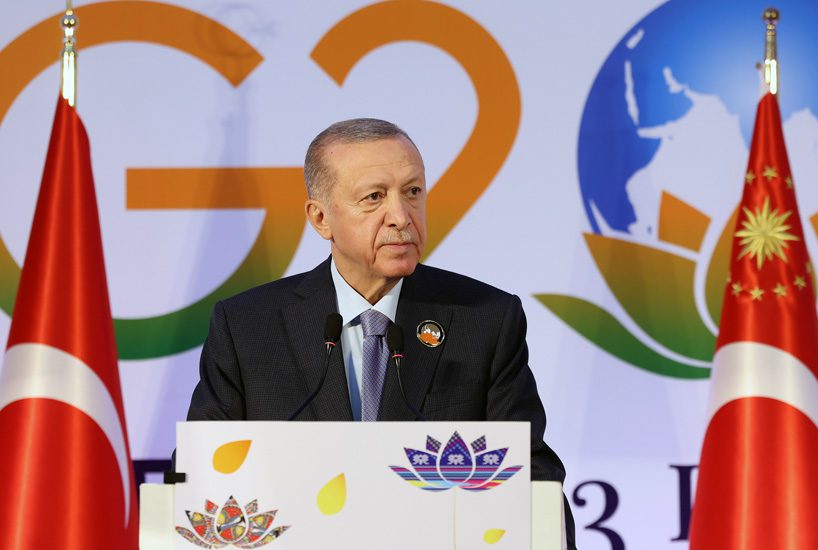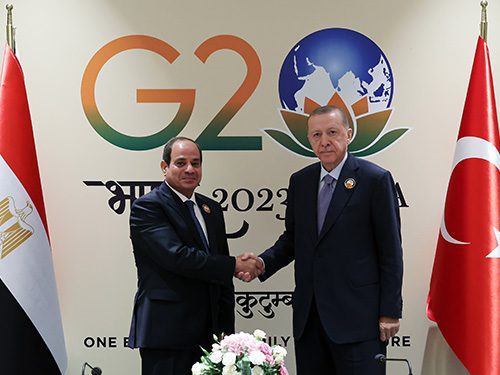Regional powers believe the United States is permanently walking away from long-standing friends and interests in the Middle East.
By JOE BUCCINO, Jerusalem Post,
Despite both parties straying from the 2015 nuclear accord, certain provisions, including the imminent expiration of specific measures, persist on autopilot, and the next phase of Joint Comprehensive Plan of Action (JCPOA), labeled Transition Day and scheduled for October 18, 2023 – eight years since adoption of the agreement in 2015 – will usher in the removal of remaining nuclear-related sanctions, ballistic missile restrictions, and associated designations.
The major powers in the Middle East, including Egypt, Israel, Saudi Arabia, the UAE, and Jordan view the threat posed by Iran the same way: as a menace to regional stability and prosperity.
Yet, the Middle East remains without a platform for a regional multinational cooperation framework to address the looming nuclear threat or the next steps as the provisions of JCPOA sunset next month.
The Biden administration has been attempting – with limited success – to chart a new course by championing the establishment of a fresh multilateral framework in the region. A new regional partnership represents an opportunity to accomplish something that has confounded Washington DC for the past 15 years: Rescope, clarify, and reduce the role of US military forces in the Middle East while contributing to a more effective and streamlined approach to security and stability.
Under President Joe Biden, the Pentagon has rightly moved resources and attention from the Middle East to the Indo-Pacific region. The administration deserves commendation for doing what the two previous administrations promised but never delivered.
However, this shift, combined with the stunning withdrawal of all American forces from Afghanistan in August of 2021, has introduced an abandonment narrative. Regional powers believe the United States is permanently walking away from long-standing friends and interests in the Middle East.
Is the US walking away from the Middle East?
In private discussions with senior US military leaders over the past year, regional military leaders reveal concerns that the American interest in, and commitment to, the Middle East has culminated or at least severely dimmed, forcing them to look elsewhere.
This concern grants China a foothold to increase its economic, military, and diplomatic influence in this part of the world. The People’s Republic of China-brokered reestablishment of relations between Iran and the Kingdom of Saudi Arabia underscores the emergence of China’s diplomatic role in the region. China looks to the area and sees only more significant opportunities for advantage in influence. The PRC’s increased technological and military presence serves as a growing strategic challenge to US partnerships, access, force presence, and security in the region.
A regional security platform headed by US Central Command focused on bolstering partner forces can address these concerns and allow a more limited, focused, and scoped American strategy in the region. But it has not been easy – and won’t be going forward.
While rightly reallocating resources from the region and toward competition with China, the administration wrongly prioritized a new JCPOA – a confusing effort that undermines the broader goal of constructing a comprehensive regional security architecture.
The whiplash from the 2015 JCPOA to the Trump administration’s “maximum pressure” campaign, to the new nuclear negotiations, undermined trust in America’s commitment to long-standing commitments in the region. There is little incentive for regional powers to push for a new agreement if the next administration may withdraw once again.
The negotiations neglected Iran’s support for proxy groups, which continue to undermine regional security and stability. The potential lifting of sanctions as part of a new JCPOA agreement always threatened to provide Iran with additional resources to bolster its proxy networks.
Tehran has also manufactured increasingly sophisticated Unmanned Aerial Vehicles. The regime now commands an arsenal of drone systems, ranging from small, short-range systems to modern intelligence, surveillance, and reconnaissance systems to long-range One-Way Attack platforms. They are building larger drones that can fly further with increasingly deadly payloads.
The US National Security Council believes these issues are untethered; the negotiations, the NSC feels, break the nuclear issue apart from all the other problems with Iran and place it in a separate bin. The problem with that thinking is that it’s clear the Iranian leadership does not see the world this way. All of Tehran’s efforts focus on sustaining the regime and growing Iran’s regional power.
Tehran sees all these actions and pursuits as interconnected: negotiations with the United States over the possible removal of sanctions give the Islamic Republic leverage over competitors in the region, primarily the Saudis and Emirates. As Tehran’s nuclear and regional activities are part of a single strategy that aims to dominate the Middle East, Washington’s policies for responding to each challenge should likewise overlap.
Further, the negotiations only fuel concerns that the United States intends to abandon the region to Iran. Additionally, regional powers perceive the deal as insufficient in addressing the broader security concerns posed by Iran’s activities.
The nuclear negotiations continued despite increasing cooperation between Iran and Russia. Even Tehran’s support of Russia’s illegal invasion of Ukraine would not deter Special Envoy to Iran Rob Malley from aggressively pursuing diplomacy with Tehran. Meanwhile, aligning two revisionist powers with expansionist agendas poses a significant challenge to our regional interests.
The new nuclear negotiations began amid a confluence of factors that eroded American standing in the Middle East: the complete withdrawal of American forces from Afghanistan, which severely limits the ability to target terror groups in that country, and the shift of troops, ships, and planes to the Indo-Pacific. The new JCPOA talks predate the administration’s pursuit of a regional security construct.
A more thoughtful sequencing, prioritizing the development of a regional security construct, would have offered greater leverage in reining in Iran’s most destructive behavior and its nuclear enrichment program. A set of negotiations led by regional powers could address all the threats posed by Iran – ballistic missile and drone production, support to proxy groups, maritime threats, and drone shipments to Russia.
So, what alternate approaches were available to address the Iranian threat? After all, maximum pressure failed to rein in Iran’s most destabilizing behavior. However, combined with the Abraham Accords, which centered around a shared concern about Iran, it did offer momentum for the Biden administration.
Combined, they introduced an opportunity to build a regional alignment focused on hedging against Iran’s most destructive behavior. The new JCPOA negotiations, by contrast, signaled that the United States believed Iran could and would negotiate and operate in good faith – an assertion that is disproved by this past week’s IAEA report.
While maximum pressure largely failed, its success was always contingent on a second Trump term. The thinking was that if Iran was faced with four more years of withering economic pressure with no new deal on the table, the Supreme Leader would agree to a serious and comprehensive negotiation inclusive of support for terrorism and missile development.
Perhaps a rush to undo the Trump policies and revert to those of the Obama administration was folly. Perhaps a more thoughtful sequencing would have forced a more salubrious outcome.
For example, a continuation of maximum pressure combined with a series of Juniper Oak power project exercises would have sent a clearer signal to Iran and the region of American strategy and commitment in the Middle East. Further, a prioritization of a regional security construct – inclusive of Israel – with consideration of the Kingdom of Saudi Arabia as the paramount security force, may have forced Iran to consider negotiations.
For the most part, the current administration did not generate these issues. Many of the same problems have plagued American presidents since Carter. And it’s certainly not the Biden Administration’s fault that the Trump administration stunned the region by withdrawing from JCPOA. However, American forces’ chaotic and complete withdrawal from Afghanistan was unnecessary and ill-advised.
Keeping a tiny element of several thousand American troops would have served regional security and spoke to an enduring American commitment to the region. In addition, attempts at a new set of American-led nuclear negotiations needed to be made more explicit, given the timing and regional sentiment.
The writer is a retired US Army colonel who served as the communications director for US Central Command from 2021 until July 2023.





